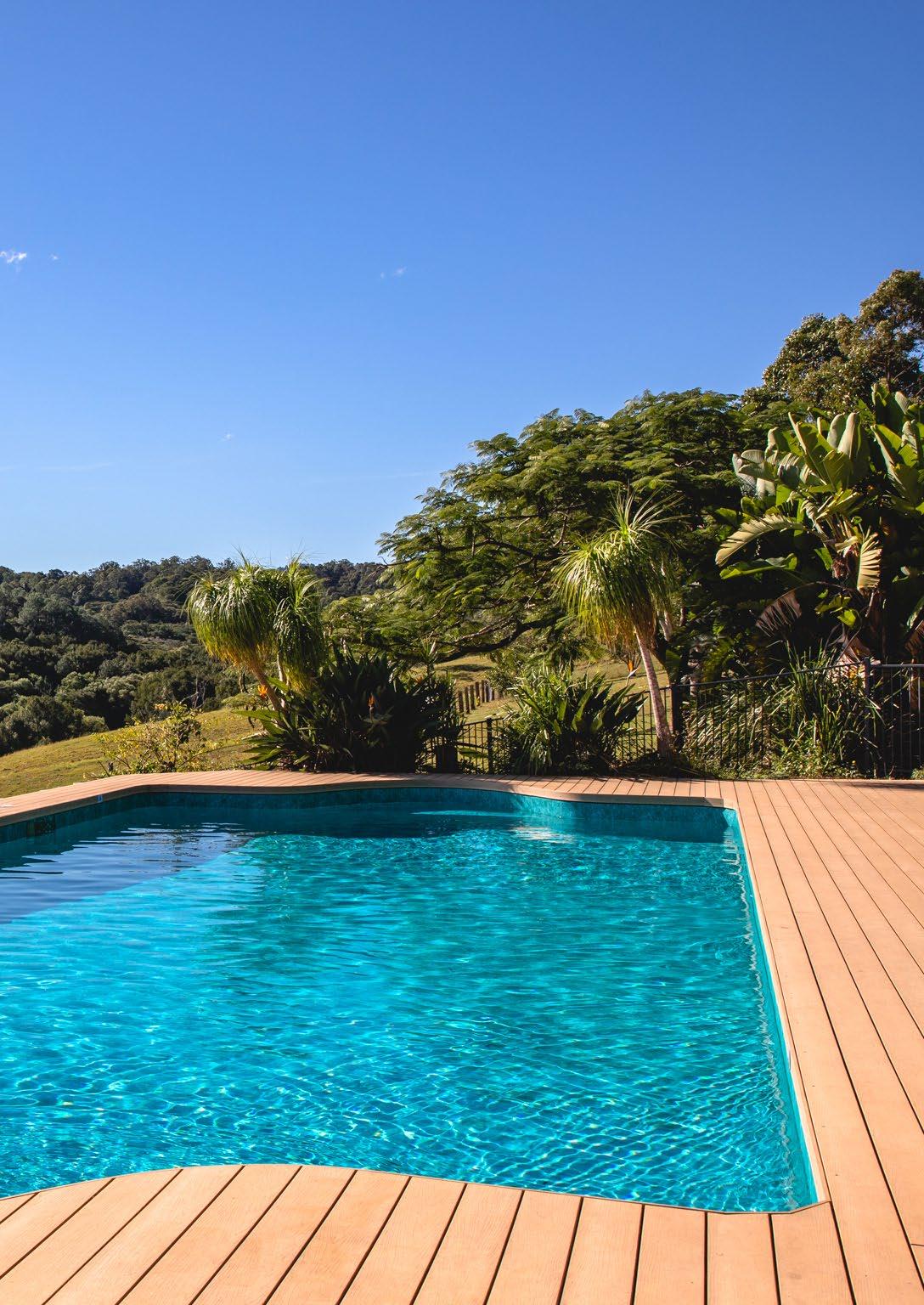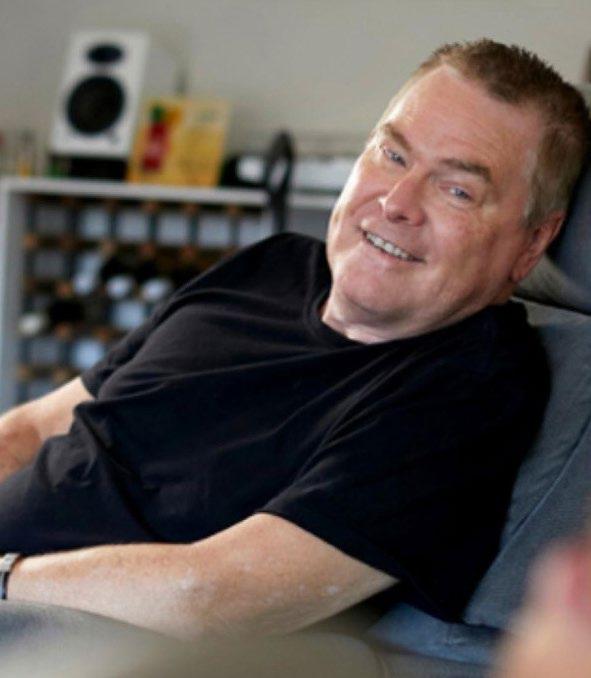
24 minute read
Motor Neurone Disease champion Peter Chambers Interview
Peter Chambers
Greg speaks with Motor Neurone Disease champion, Peter Chambers.
Advertisement
For many, the MND journey can be a rollercoaster and for Peter Chambers, his journey was no different. Pete had symptoms for around 18-months leading into his diagnosis in December 2019. And as he explains, no stone was left unturned when investigating the cause of his symptoms. “There were three or four things the neurologists were looking at and had to exclude. MND was always in the background, but it was never the likely diagnosis during that 18-month period,” he says. “When it was finally diagnosed as MND, there were tears, but it didn’t come as a complete and utter shock. I was kind of prepared for it, but when you hear those words, it’s not what you want to hear”. Not wanting his diagnosis to define him, Pete has used it as the catalyst for his positive mindset and desire to help others. “I wanted a legacy that is not negative. There’s no way I want people to look at me and remember me as being someone who couldn’t cope with this.”
Greg T Ross: It’s a pleasure meeting you, Peter Chambers and thanks for joining us here at The Last Post. I know little about MND and motor neuron disease. I’m just wondering, what’s your story and what can you tell us about what’s happening? Peter Chambers: Yeah, look I’m same as you, Greg. I knew bugger all about it as well. I suppose, in Melbourne you might be a little bit different in the rest of the country, but we’re very AFL centric here, so we had Neale Daniher, starting a massive cause, which is just wonderful in terms of raising awareness of the disease and doing a hell of a lot for raising money for research. But I think without Neale, and again, in the Melbourne environment, I don’t think we’d know too much about it as well. GTR: And Neale contracted motor neuron disease, what, 10 years ago or something? PC: Yeah, I think seven or eight, from what I understand. Yeah. GTR: He’s done remarkably well. PC: Oh, it’s extraordinary, what he’s done, absolutely extraordinary. So yeah, I think I’d be in the same camp as you, mate, that I wouldn’t have known too much about it prior too. So yeah. Look, my story is, I suppose with hindsight, this is a very much a hindsight thing. My first symptoms, probably as early as 2016, just little things, my arms were starting to get a bit weak and my hands would starting to get a bit weak. So, 2016 I started getting these symptoms and just a little feeling something was wrong. So I ended up having some spinal surgery in 2018 and that was to decompress the spine and all sorts of things, which was in theory supposed to be the answer. It turned out it wasn’t, and I actually regressed as a consequence of that surgery to the point where I lost most of the use of my right arm from that point on. And then spent a pretty agonizing 18 months or so. Unfortunately, it’s one of those diseases where you don’t identify it. It’s a process of exclusion, where you look under every rock that you can look under and when there’s no more rocks, you’re left with MND, which that makes it tough, because that would have been an 18 month process, and depending on the stage that you’re at, it’s not inconsistent to have that sort of time lag before you get diagnosed. So, the version I’ve got is called flail arm, which as the name suggests, is attacking my arms. The nerve cells basically die, and they support the muscles and it really just kills the muscles. So my version is flail arm, and it’s seen as a slow progression. I’ve heard cases where it can take you literally in months and you see a lot of cases that are a lot worse than what I am at the moment. So yeah. So that’s the very brief background there. GTR: That’s all right. Thank you, Peter, for sharing that with us. And I was just wondering, what was your life like before, and what were you doing when you discovered this? PC: Yeah, so I’ve had a career in banking, so I’m 59, Greg. Had a career in banking, had some pretty senior roles, and doing some good things. And it’s an industry I enjoyed, not the most exciting industry going around, and not a conversation starter at a barbecue, but I’ve moved on from that. Avoid the banker over there. But, no, I had a good life there. I finished work in probably early-ish in 2019. And yeah, look, I hadn’t been diagnosed at that stage, but one of the factors of MND is the fatigue just really gets you. And I got to the point where, if I did that process in the morning of getting up, having a shower, having a shave, getting dressed, having breakfast, and I’m back to bed at that point. I’ve got no energy left at all. So
–– INTERVIEW ––
I dragged myself into work and pretending to work for three or four hours and going home again. So we called it quits at that point. But then there was another six months or so, it was the end of 2019 before I was actually diagnosed. So I still had that period of not knowing. And that was a really difficult period to deal with. It was always in the background, but until such time, as those three little letters were mentioned, it wasn’t MND. And so, yeah, still hit pretty hard when it was diagnosed finally. And then that was confirmed in early 2020. And of course, 2020 was a cracking year, wasn’t it? We had a barrel of laughs last year. GTR: Geez, I’ll tell you what, Peter, it’s been one thing after another for everyone. And you’ve been dealing brilliantly with this from all accords. Where has the strength come from and who has been assistance to you in this journey? PC: Yeah, it’s a good question. So much of it comes from within. Again, a little bit of a segue into what I’m doing at the moment, actually, I started off with a podcast. It would have been late last year and really a few things started to snowball from there. And I asked myself, what sort of legacy I wanted to leave. And I wanted to capture something on video. I wanted to capture moments on video. And so I’ve met a terrific videographer from there. And so we’re just capturing moments and she’s editing, and we’ve started a YouTube channel and so that’s been a wonderful little ride and I’ve really loved it. So that’s become my crusade, if that’s the right word. I found myself by accident, I think, as becoming a bit of an advocate for promotion of the disease and just talking about it and being someone again, I’m in the fortunate position, I can still, as you can obviously hear and see, I’m living a reasonably normal lifestyle. I’ve pretty much lost the use of my arms now. I’m very limited in what I can do and I get fatigued and whatever, but I’ve adapted my lifestyle around that. So, I do one thing a day only, and that’s my diary. And if you want a second thing in the diary, well you have to find another spot. So, that sort of thing’s helped. So it’s found me rather than me going looking for it. But once I found something that was all the important things, mentally stimulating, meant I had something to do with my life. I’m not the sort of guy that goes around blowing his own trumpet, but you start to hear, “Oh, I heard your podcast, and gee, it was fantastic. And you’re so inspiring.” And whatever, and you hear people saying that sort of stuff, and you go, hang on a minute. I didn’t start this to move people or whatever, but it’s happening. So, that kind of, again, that lit the fuse a little bit. The obvious support is family and I’ve got a lovely, wonderful, supportive wife who’s been terrific in supporting me in everything I’ve been doing. And 22 year old twin boys who, again, they’ve adapted really well to our environment. And they’ve had to deal with the COVID thing of, being young and their life getting put on hold and all that sort of things. So I think they’re learning things as well about themselves. GTR: I was just thinking, my wife died of pancreatic cancer in 2017, so you have my blessings and you’re so lucky to have a loving wife, and it’s a beautiful thing. And twins, I’m a twin also Peter, so I can relate to that.
So you’ve been doing things through this that you may not have done before, particularly, the YouTube channel, et cetera, that you’ve just spoken about. And along the way, you’ve learned more things about yourself, I guess. PC: Oh look, absolutely. Absolutely. And I’ve met people, I’ve been exposed to different things and different ways of thinking. Your life is what it is, and you get a fairly structured way of thinking and doing things and then all of a sudden, yeah, I’ve had to think differently about things. I’ve become a bit more creative with the way I think, and whatever. So it’s a bit of a running joke inside the family, that I’ve never been busier. My wife now, she runs her own business and she’s wound that back a fair bit, but she’s become my PA. Everything I do now, I put a calendar note in my phone and copy her in and whatever else, so she can work out her lifestyle around what I’m doing and whatever. So, yeah. I’ll give a classic little example. I’m actually on a trial at the moment. There’s only four cases in the world where this has happened, but it’s putting a stent in your brain. The stent acts as a brain computer interface to help with communication. So I’m currently on this trial and in the middle of the phase of... There’s my phone going. So it’s all happening here. I’ve killed that. So yeah, I’m currently in this screening phase. But, when I was approached by a neurologist I was seeing and, do you want to do this? I mean, you jump out of your skin at that stage to be at the forefront of technology that’s absolutely cutting edge, and it’s only being done in Melbourne and those sorts of things. You shake your head. So it’s exciting. I’d trade my health in a heartbeat to be back to my normal life as it was two or three years ago, but, I’m embracing what this has thrown at me. I don’t think that there’s any other way to do it. I completely understand, and, there’s so much mental health going around now, and it’s only because we know about it more. I mean, there was probably the same amount many years ago, but we’re able to identify it and deal with it and whatever else. And I completely would understand where someone in my situation, wouldn’t be able to find the get up and go to be able to do it. And as I say, none of this is by design. It just followed me around and caught up with me and I’m on that train now. So, it’s a good ride and why the hell wouldn’t I enjoy. Unfortunately, I have got a bit of a timeframe. I’m the same as everyone else, we’re all dying. It’s just the case I’ve got a bit more definition around the how and the why, than most. GTR: And so, Peter, I’m thinking obviously your ability to become creative and these are extensions of who you were anyhow, but you probably hadn’t discovered that. I don’t know. But what would your message be to others that are going through the MND experience, motor neuron disease experience? PC: It’s a really hard one, because of this inevitability about the mortality side of it. I actually was fortunate enough to speak last week because I’ve been on a committee to, I suppose, work on the communication process out of MND Australia. And that includes revamping the website and whatever else. So I was the guy who gave it a user’s experience in terms of what is useful on the website and those sorts of things. So I was at the launch last week. And I was lucky enough to go to Canberra speak in front of a few senators and the like, to launch the website and a couple of other initiatives hanging off that, but what I spoke about there was about hope. The whole MND community, unfortunately, and I hate saying this, but it’s geared to the fact that this is an incurable disease. So there’s that inevitability about it. And so you’ve got this whole structure, this whole infrastructure is around supporting you until that inevitability arrives. And that’s really tough to take, right? You spend your whole life going to doctors and, and having a cure for things, or you hurt your knee and whatever, and there’s someone will fix it for you. But there’s no bouncing back with this. And so my theme was about hope. I think this community that has MND, the families, the carers, the whole network, I really think there’s that hope aspect to it. And there’s a number of things I’ve seen, which I’ve lived, that there are a lot of gaps in the system. I know there’s a lot of trials going on, but I think we need to be at the forefront of being more positive and more proactive about those trials, to try and get more happening in that regard, so that the research increases. So I think I speak for a lot of people that a lot of people would be putting their hand up to be the subject of a trial, but, I think that lack of proactivity around that sort of stuff makes it tougher. Well it did for me anyway. Again, I don’t know if I’m speaking on behalf of others, but I just found, again, I had to go searching for trials rather than, I’d like someone to put a suite of trials in front of me and saying, “Well, you’re perfect for X, Y and Z, so, would you consider those?” But it was me asking. I had to ask the question a lot in order to see if there’s any trials that suited me. So, that’s where the hope comes in, right? That’s where we are giving people down the track who will contract this, we are offering them hope. And that’s probably the biggest one I’d like to change. I’d like to give people hope and I don’t know how you do that again. It’s incurable. So how do you give people hope around something that ultimately has no or offers no hope? It’s a really tough one. I understand that. But I just think if you change that mindset a little bit, I think it has the ability to change things up. GTR: Yes. Well said, Peter and more attention, I guess, which we’ll provide through podcast, obviously with this, to the general public to become, as you said, it will strike others. It could strike anyone. And if, for people to be aware that research into this is essential to provide more hope for those that will contract it, Peter. PC: Look, absolutely. I mean, I’m not privy to the amount of research goes on. I’m certain it’s an enormous amount. Webinars pop up and I follow groups on Twitter and those sorts of things. So you see across the globe, what’s happening, and whatever. So, I’m certain, absolutely certain, that there’s a whole lot of work going on behind the scenes in terms of that research and whatever else. GTR: We wish you continued success in what you’re doing and how you’re getting out to the Australian public and indeed the world. And we honour you, and we think that you’re a magnificent example of what can be done in situations that are less than favourable. So we send our love and blessings and we know that we will follow you and we’ll get a few more people to watch you and to listen to you, Peter. Thank you very much. PC: That’d be fabulous, Greg. I really appreciate the opportunity and the platform you provide because, without this sort of thing, we don’t have the opportunity to talk about it, and this is a case of using social media and all those sort of things for good, instead of evil, which is a nice surprise.
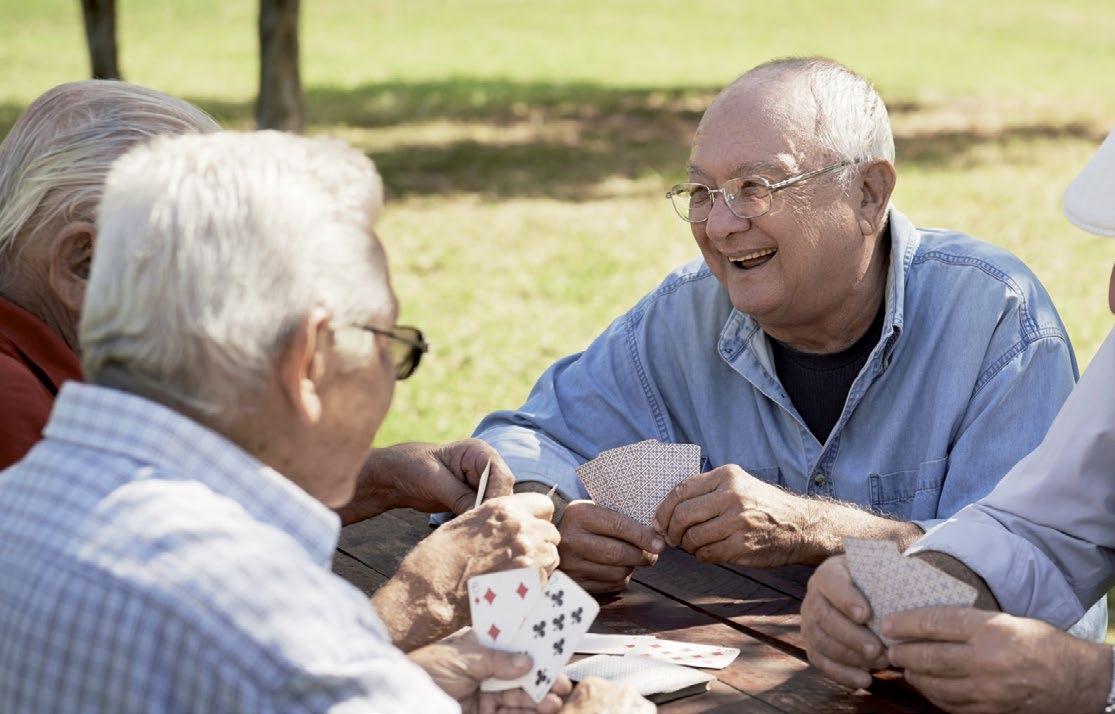
Your rights. Your voice.
Listen to Greg’s recent interview with Senior Rights Service CEO Shannon Wright in the Podcasts section of our website: PODCASTS: www.thelastpostmagazine.com/tlp-interviews

It is estimated that 1 in 5 Australian young people are living in families impacted by mental illness. Kookaburra Kids is all about supporting these young people, promoting mental health education and teaching safe, positive help-seeking behaviours.
We have developed a dedicated program to support the unique needs of kids aged 8 to 18 from serving and ex-serving ADF families across Australia that includes Camps, Activity Days as well as participation in our online Connect sessions. We aim to empower young people, build resilience, develop life-long knowledge, skills and abilities so they can reach their full potential, and live beyond the impacts of family mental illness. Best of all... it’s fun! Visit www.kookaburrakids.org.au to learn more.
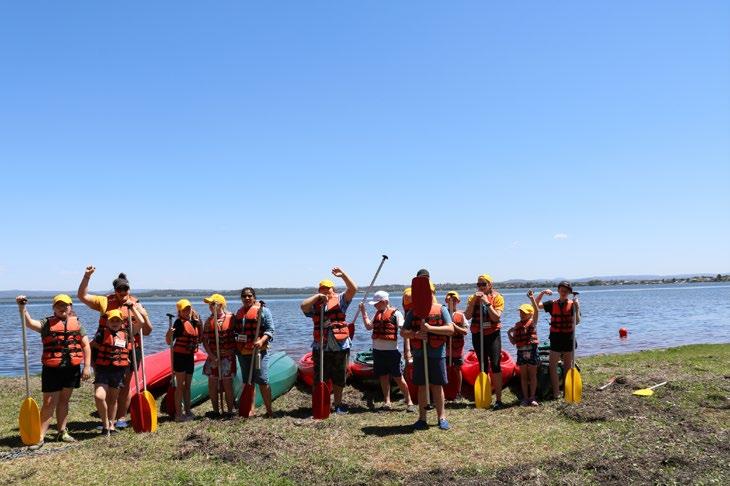

SUPPORTING THE UNIQUE NEEDS OF YOUNG PEOPLE LIVING IN VETERAN FAMILIES IMPACTED BY MENTAL ILLNESS.

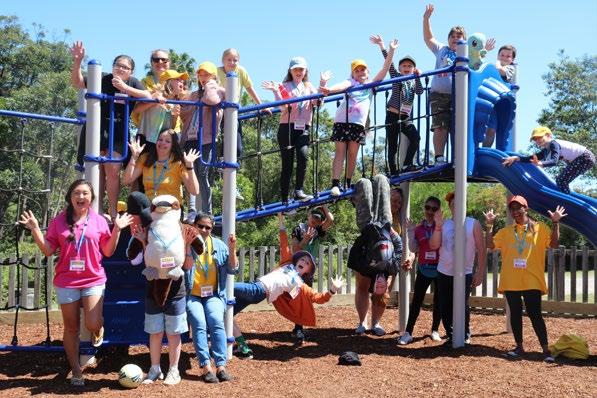
BRINGING TOGETHER KIDS FROM SIMILAR SITUATIONS TO PROMOTE MENTAL HEALTH EDUCATION AND TEACHING SAFE, POSITIVE HELP-SEEKING BEHAVIOURS.
To learn more, visitwww.kookaburrakids.org.au
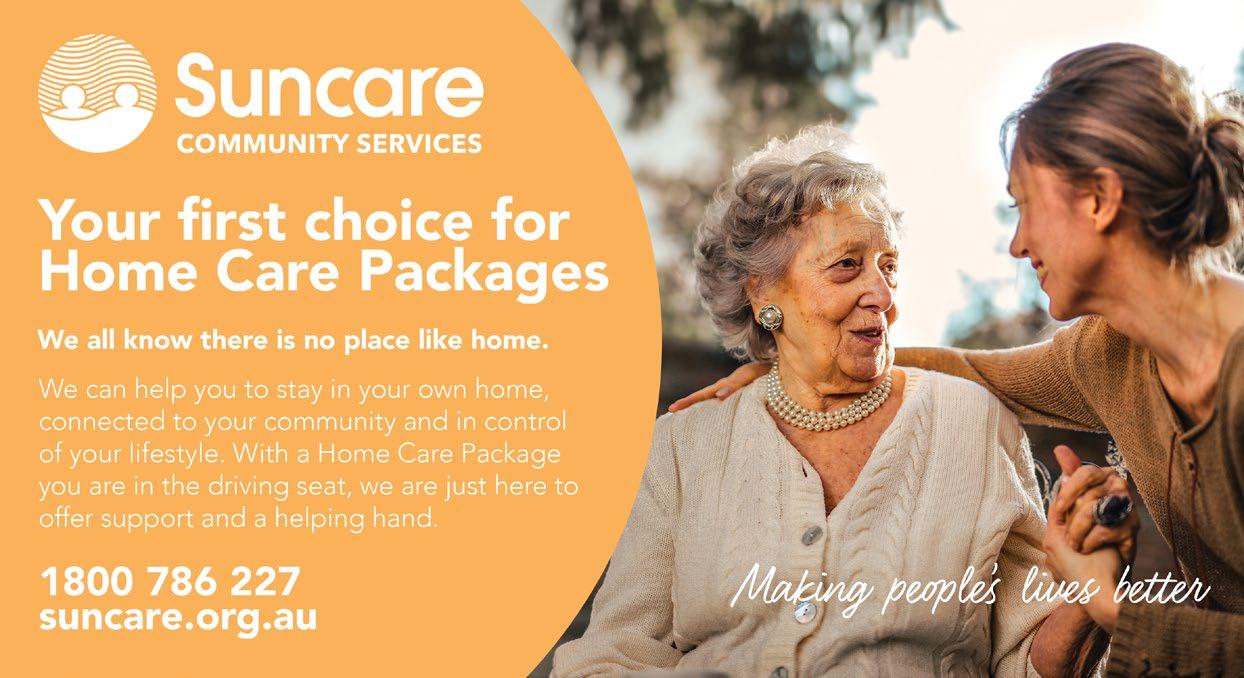
The MedWalk diet: a step closer to walking away from dementia
It’s been named the world’s best diet for weight loss, but now researchers at the University of South Australia are confident that the Mediterranean Diet – combined with a daily bout of exercise – can also stave off dementia, slowing the decline in brain function that is commonly associated with older age.
In the world-first study starting this week, researchers at the University of South Australia and Swinburne University, along with a consortium of partners will explore the health benefits of older people adhering to a Mediterranean diet, while also undertaking daily walking. Termed the MedWalk Trial, the two-year, $1.8 million NHMRC-funded study will recruit 364 older Australians – aged 60-90 years, living independently in a residential village, and without cognitive impairment – across 28 residential sites in South Australia and Victoria. It’s a timely study, particularly given Australia’s ageing population, where around a quarter of all Australians will be aged 65+ by 2050. Lead UniSA researcher, Associate Professor Karen Murphy, says combining the dietary benefits of the Mediterranean Diet with the health benefits of an exercise intervention could deliver significant benefits. “Dementia is a condition that affects a person’s thinking, behaviour and ability to perform everyday tasks. While it is more common in older Australians, it’s not a normal part of ageing,” Assoc Prof Murphy says. “In Australia, around 472,000 people are living with dementia. Each year it costs the economy more than $14 billion which is expected to balloon to more than $1 trillion over the next 40 years. “While there is currently no prevention or cure for dementia, there is growing consensus that a focus on risk reduction can have positive outcomes. That’s where our study comes in. “Early pilots of our MedWalk intervention show improved memory and thinking in a sub-group of older participants adhering to a combination of Mediterranean diet and daily walking for six months. “We’re now extending this study across a broader group of older Australians, using carefullydesigned behavioural change and maintenance strategies in the hope of substantially reducing the incidence of dementia across Australia.” A Mediterranean diet is high in fruit, vegetables, legumes, whole grains, and fish, while being low in saturated fats, red meat, and alcohol. The 24-month study will randomly assign residential community sites the MedWalk intervention, or their usual lifestyle (the control group), so that all participants who live at one facility will be in the same group. Changes to diet and walking will be supported through organised and regular motivational, dietary and exercise sessions. Head of Neurocognitive Ageing Research at Swinburne’s Centre for Human Psychopharmacology and Chief Investigator, Professor Andrew Pipingas, says this trial is about trying to prevent the onset of dementia. “As it’s extremely difficult to find a cure and treat those in the later stages of the disease, focusing our efforts on helping those at risk of developing dementia to stay healthy is one-way to ensure Australians stay well in future.”
Supporting veteran families
It is widely acknowledged within the Defence community that families of veterans and service members need support. In 2019, we did a small pilot study with family carers – mostly partners – of veterans, to assess their psychological and physical wellbeing and to understand how the psychological wellbeing of family carers was associated with their physical wellbeing.
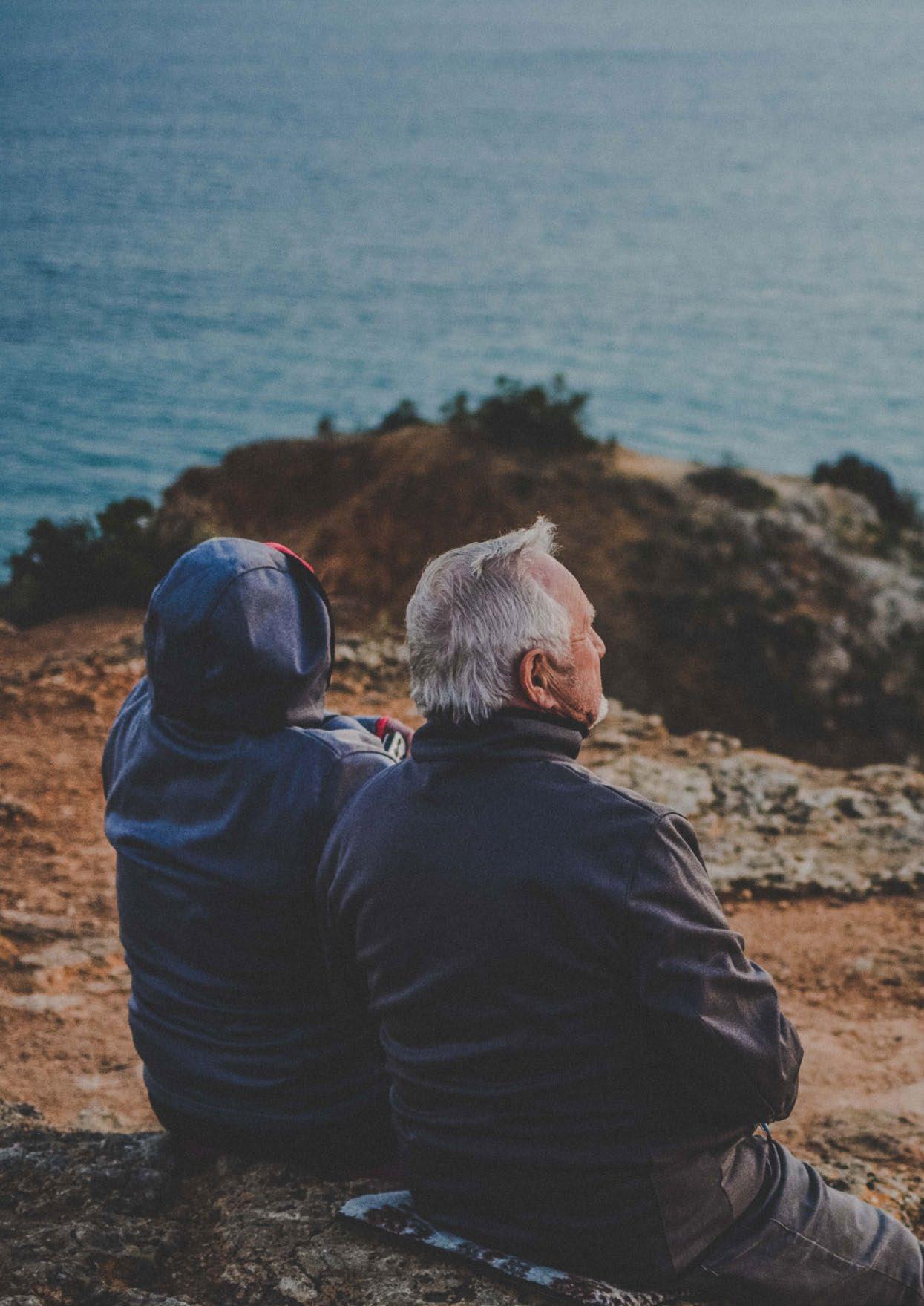
Our findings demonstrated that around 70% of the family carers involved in the study had moderate-to-high levels of psychological distress; that family carers had lower levels of physical activity when compared to levels of physical activity done by the general population; and that family carers who were identified as being more resilient were likely to do more physical activity. Family carers told us that they often undertook their role in challenging circumstances and that this was sometimes to the detriment of their own health. There is strong evidence for the link between physical activity and mental wellbeing, and the role of social engagement in supporting mental wellbeing. Family carers who are unable to make time to do things to support their own wellbeing, such as walking the dog, catching up with friends or participating in activities they enjoy, are likely at increased risk for poor physical and mental wellbeing outcomes. In many cases, family carers don’t attend to their own health needs and often, this is because their focus is on the person they are caring for and they do not have the time nor the support to attend to their own needs. Beyond this, family carers have indicated that they feel that their role in supporting veterans and service members is not acknowledged or considered when it comes to decisions being made about veterans and service members and their welfare. Additionally, the feedback we’ve received from families, and family carers in particular, is that they are sick of answering questions and that they feel like they’re not being heard. We are a team of researchers at the University of South Australia (UniSA). In our role as researchers, we have an obligation to make sure that: 1) the investigations we are doing are translated into benefits for the population; 2), we are respecting the time people give us to participate in our research; and 3), we acknowledge that for many, their experiences have been a source of trauma for them and their family. Because of this, it is important that we do not just collect information to complete a report that then sits on a shelf, but instead, we take steps to make sure that the information gets to the people who can do something about it. This includes organisations that support families, veterans and service members, advocacy groups, government departments and individuals who can support change in policy. Our team is currently doing a project that builds on the work we did with family carers in the pilot study. This project, co-funded by UniSA & the Breakthrough Mental Health Research Foundation, will extend our understanding of the wellbeing status of family carers of Australian veterans and serving personnel, and is intended to identify the practical and emotional supports required by family carers to assist them in their caring role and day-to-day life, as a means of preventing depression and supporting family wellbeing. We’re hoping to collect information from families Australia-wide. We want to know whether there are differences for families based on their location in Australia, whether that’s the state or territory they live in or whether differences are due to living in a metro, rural or remote location. With this information we will be better placed to advocate for the supports that families need. However, not many people are doing the survey and we would like your help to get the information needed. Family carers may be a partner, parent, adult child, or sibling of a veteran; someone who provides daily support to a veteran. We’re even interested in finding out what you think of the term ‘family carer’ – is this how you see yourself; does it even matter what we call it? We’ll collate the information you provide and then build recommendations about what you need. What is missing currently? Are more services required? Is it that there are plenty of services available, but you don’t know where they are or how to find which is the best one for what you need? The findings from this study are intended to be applied in future to inform strategies to support the wellbeing of family carers of veterans and service members, and of families of veterans and service members generally.

If you’re interested in participating or if you’d like more information about the project, you can access it via this link: www.redcap.link/Family_Carers_Survey_Breakthrough_UniSA or you can contact Hannah Cockram (Hannah.Cockram@unisa.edu.au). The research team is: Dr Dannielle Post, Professor Gaynor Parfitt, Dr Kate Gunn, Dr Katherine Baldock, & Hannah Cockram, from UniSA. This project has been approved by the University of South Australia’s Human Research Ethics Committee, protocol 203453.
Veterans COPE Recovery Program
6-week residential program for Veterans Commences 8 November – 17 December 2021
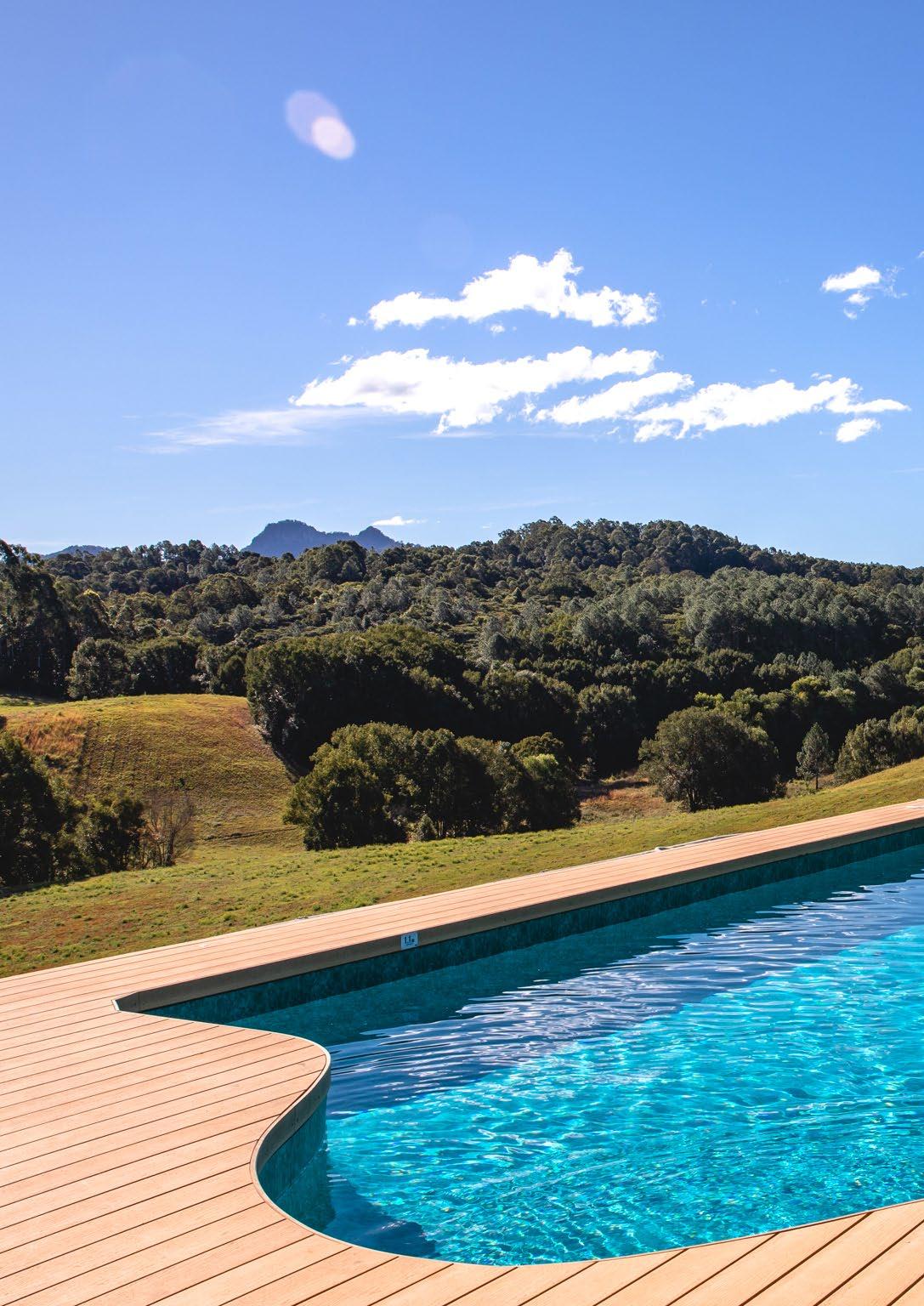
The Veterans COPE Recovery Program is a six-week live-in program to reduce the impact of Post-Traumatic Stress Disorder (PTSD) and Substance Use Disorder (SUD) for Veterans.
COPE stands for Concurrent Treatment of PTSD and Substance Use Disorders using Prolonged Exposure. COPE is evidence-based and modelled on the principles of Cognitive Behaviour Therapy (CBT) and relapse prevention. Under the COPE treatment model, PTSD and substance use disorder are treated simultaneously rather than as separate issues. The developers of the COPE program, the Department of Psychiatry and Behavioural Sciences at the Medical University of South Carolina, have trained the psychologists delivering the program. The Buttery is experienced in delivering traumainformed treatments in a therapeutic community where participants support each other in their recovery. The residential part of the program is held at a comfortable retreat on a peaceful acreage near Murwillumbah, NSW. The program provides: • Structured daily living. • Support through physical and psychological safety. • Acceptance and encouragement for every participant and support for nutritional values and a healthy lifestyle. Elements of the program include group therapy, psycho-education, meditation, yoga, pilates, massage, exercise, good nutrition and other activities to promote holistic recovery. The six-week residential program is followed by three months of aftercare that is conducted by phone or video conferencing. COPE is free of charge to veterans who meet eligibility criteria. To be eligible for the program, participants should be:
• Currently experiencing PTSD. • Affected by a substance use disorder. • Committed to remaining abstinent from substance use while in the program and have undertaken a detoxification program before attending (if required). • A former member of the Australian Defence
Force (Army, Navy, Air Force). • Participants require a referral from a practicing psychiatrist.
Please get in touch with The Buttery intake on 02 6687 1111 - Monday to Friday from 9 am to 4.30 pm AEDT or download the Referral Form and forward it to your psychiatrist. The Buttery is a not-for-profit charitable organisation, which has been helping people with alcohol and other drugs misuse and mental health issues for nearly 50 years. The organisation has provided services to over 5,000 participants in its residential programs and over 20,000 participants in its outreach services. The Buttery delivers long and short-term residential rehabilitation programs and several evidence-based outreach programs and aims to help each participant learn about their mental health and substance use and put strategies in place for a healthy and fulfilling life.
